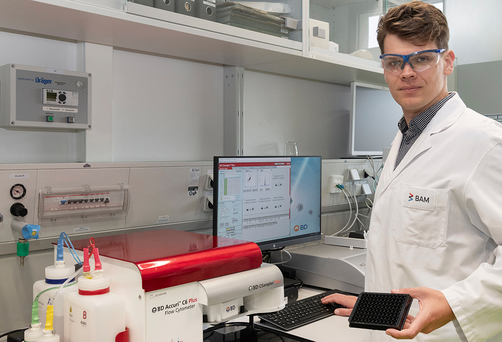
The team of SAFIA Technologies: Ayberk Coşkun, Nick Gundermann, Dr. Timm Schwaar, Dr. Peter Carl (from left to right)
Source: BAM
Project period
01/04/2020 - 01/03/2022
Project type
Project status
Closed
Description
The EXIST project SAFIA Technologies is developing an innovative multiplex rapid test (immunoassay) for practical use in commercial food and environmental analysis.
Location
SAFIA Technologies |
Bundesanstalt für Materialforschung und -prüfung (BAM)
Richard-Willstätter-Straße 11
12489 Berlin Adlershof
Mycotoxins (mould toxins) can be a problem in cereals and cereal products. Source: BAM
In food monitoring, many samples are typically tested for different parameters. Despite the ongoing automation of individual steps, testing is still expensive, time-consuming and labour intensive. SAFIA Technologies addresses this problem by developing a particle-based multiplex immunoassay for parallel detection of contaminants.
Source: BAM
SAFIA Technologies aims to develop a particle-based immunoassay kit for the detection of mycotoxins in food and feed. The assay will be able to detect mycotoxins regulated by the EU. Thus, the assay enables users to determine whether mycotoxin concentrations exceed maximum allowed levels or not.
Source: BAM
Polystyrene core/silica shell particles are used as a platform for competitive immunoassays. Particles are coated with an anti-fouling surface allowing the coupling of haptens. A competitive immunoassay is generated utilizing the functionalized core-shell particles. The assay requires antibodies, which must be tested and developed if necessary. The assay conditions are then optimised so that the immunoassay can be performed without washing, i.e. in a mix-and-measure procedure.
Source: BAM
Coordination
Bundesanstalt für Materialforschung und -prüfung (BAM)
Partner Organisation
Profund Innovation, FU Berlin
Funding
The project is funded by the EXIST Research Transfer funding programme of the Federal Ministry of Economics and Energy.
SAFIA Multiplex rapid test for practical use in commercial food and environmental analysis
SAFIA Technologies aims to develop a multiplex immunoassay for the detection of mycotoxins in food and feed. By integrating the SAFIA technology into the production chain, the project wants to provide comprehensive monitoring. The unique SAFIA particles offer the advantage of beeing both resistant to water and organic solvents. In addition, the silica shell can be chemically modified in a variety of ways so that toxins can be easily coupled to the surface. Functional groups, such as polyethylene glycol groups, can be attached to the surface to suppress non-specific binding. That makes the practical execution of the assays easy - namely without washing. The team of SAFIA Technologies is currently developing a prototype. It will be capable of analyzing samples, e.g. a grain extract. It will contain a few reagents that only need to be mixed with these extracts..
SAFIA Technologies is based on several years of preliminary scientific work. The technology has already been successfully used in environmental analysis.

Dr. Timm Schwaar monitoring the SAFIA particles on a flow cytometer
Source: BAM
Simple implementation, time and cost savings
While most heterogeneous immunoassays require the removal of excess or unbound reagents between incubation steps by washing the solid phase, homogeneous immunoassays do not require washing steps. As a wash-free assay, SAFIA offers the advantage of being particularly quick and easy to perform, as the reagents and sample only need to be mixed. Also, multiplexing, i.e. the simultaneous performance of several measurements, allows a significant increase in sample throughput. In addition, less plastic laboratory consumables are required. This further reduces analysis costs and prevents waste.
Further possible applications of the SAFIA platform technology
It is estimated that about 4% of all adults suffer from food allergies. Many people also suffer from food intolerances. SAFIA Technologies aims to enable the detection of different allergens in one measurement using the mix-and-measure principle.
Partners
Bundesanstalt für Materialforschung und -prüfung (project coordination)
Profund Innovation, FU Berlin
Funding
The project is funded by the EXIST Research Transfer funding programme of the Federal Ministry of Economics and Energy.


